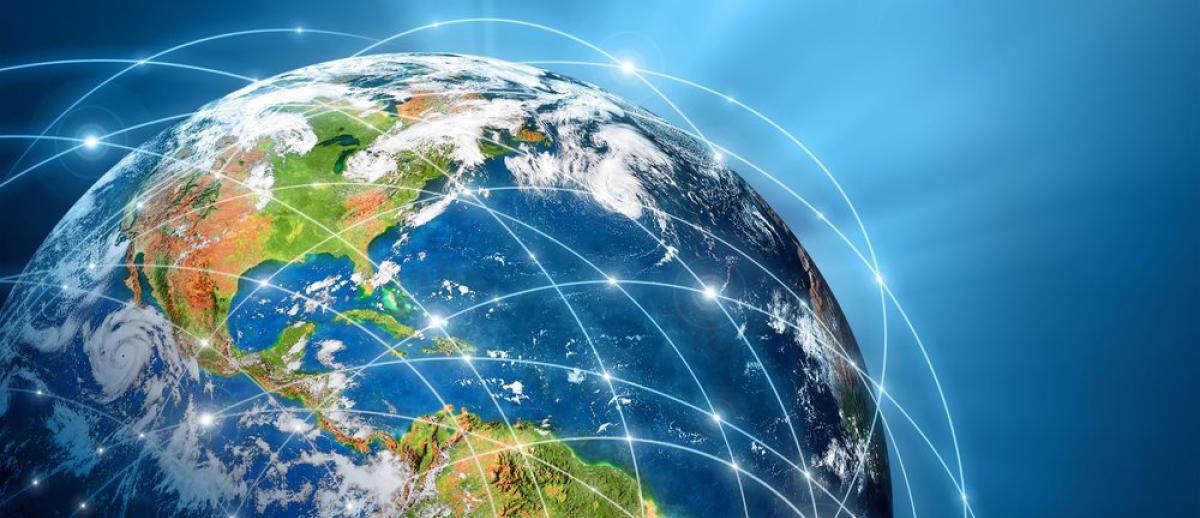Rethinking the 2010s
archive


Flowing lines crossing the globe. | Image from New America
Rethinking the 2010s
This text will discuss some of the issues raised in the series led by Roland Benedikter and Ingrid Kofler, focusing on the first of the five Rs they posed, namely “refining” (Benediketer; Kofler, 2019). In doing so, I will especially consider the periodization of globalization. Periodizations imply a reading of history that responds to different theoretical and political sensibilities, such that every periodization reveals a vision of social phenomena linked to different priorities in the processes of historical causation. Take, for example, the transition to the most recent phase of globalization. Many Liberals choose the end of the Second World War, focusing on the emergence of the American superpower, the UN, and the Bretton Woods institutions (Giddens, 1990). Marxists identify the beginning of the 1970s as the decisive phase, but the ones put forward bottom-up perspectives centered on the importance of workers and anti-colonial struggles (Hardt; Negri, 2000); the others, on the other hand, favor top-down perspectives centered on the crisis of capital accumulation and states apparatuses (Gindin; Panitch, 2012). Realists, however, prefer to date the advent of the new world order to 1989-91. And even here, things can be analyzed very differently, even within the same political sphere. If we take the conservative field, for instance, Samuel Huntington’s antagonistic vision of the “clash of civilizations” (1996) is a pessimistic and direct response to the ironic “end of history” of his former student Francis Fukuyama (1992). Thereby, each choice opens up singular readings of the historical course based on an analytical grid that proposes different intelligibility schemes of global history.
As regards the present, I would like to take the outbreak of the economic crisis in 2008 and the unleashing of the pandemic in 2020 as two key moments in which a plurality of medium-term trends crystallized. These highly symbolic dates coincide with two major crises. And major crises, by definition, are very important periods of transition, during which power structures and economic relations are radically reconfigured. Crises indeed play a constituent role. Think of the social, economic and political crises that hit European and North American societies at the end of the 1960s and the beginning 1970s (the 1968 uprisings and the 1973 oil crisis represent the two most symbolic dates). Just take into consideration phenomena such as the end of Fordist Keynesianism, the financialization of the economy, the reshaping of national sovereignty, the precariousness of the labor market, and so on. All this has to do with the transition to global neoliberalism. And this transition, even if it is a vast and very complex process, had, in my opinion, two strong moments (at least in the Western world): the first, following the 1968-73 crises (Boltanski; Chiappello, 2000), and the second, precisely, after the 2008 crisis, which radicalized and strengthened processes of neoliberalization, further accelerating and sharpening the dynamics already at work.
Regarding this second moment, I sustain the following thesis. If the crises of the 1970s determined a paradigm shift (from Fordism to neoliberalism), the 2008 crisis catalyzed medium-term trends, implying a shift within the paradigm: the transition to a new, harsher, and more deadly phase of neoliberalism – opening up then, on the question of the pandemic. It is still too early to say, but with COVID-19, are we entering a new phase of globalization? And if so, what kind of phase? Are we witnessing an even more reactionary reform of neoliberalism, but one that, to some extent, internalizes elements of the reproduction of nature? Or are we dealing with progressive glimpses on which hopes of a post-neoliberal world can be built? Think in this respect of all the current debates on the decarbonization of the economy and the ecological transition that accompany the recovery plan announced by the Biden Administration, the EU Next Generation Programme, or Beijing’s maneuvers to boost economic demand and public investment based on more equitable social redistribution of wealth. What is this all about, a paradoxical eco-neoliberalism or a transition towards a post-neoliberal society that is ecologically sustainable? Moreover, is this a game between the upper echelons of world politics, or can social movements be actively involved in these dynamics? And what role can be played by reactionary forces, which continue to display denial, both about global warming and the pandemic?
In this respect, I think that one could consider at least four macro-themes: the mutations of global capitalism, the so-called authoritarian turn of neoliberalism, post-crisis social movements, and the pandemic, examining it as a crisis endogenous to capitalist development. That is, the pandemic as the flipside of the brutal exploitation of nature, deforestation, agribusiness, and the integration of the animal kingdom into commodification processes (endogenous because all this constitutes the material conditions of possibility for zoonoses). The pandemic, then, as the dark side of productivism and processes of profit-extraction from nature (Wallace, 2020). These four macro-themes seem to provide the pillars to build a critical introduction to the past decade’s transformations of the world order, illustrating in a salient way the main logics and trends through which the past decade has unfolded. They deliver, in fact, a set of emblematic processes that make up the constellation of the 2010s: extractivism, logistics, platform corporations, state authoritarianism, the transnational circulation of social struggles, spillover, lockdowns, etc. These phenomena are, in fact, like prisms, allowing us to cast a new light on the world politics of the 2010s (compressed as they are between the 2008 and 2020 crises).
From this point of view, we could sustain that the 2010s are a decade that perfectly embodies the diagnosis expressed by Antonio Gramsci in his Prison Notebooks shortly after the 1929 crash, in which he said: “The old is dying, and the new cannot be born.” He put forward that the 1930s represented a transitional phase, in which the old society and the old balances that reigned before the Great War and the Great Depression had disappeared but in which new stable social relations had not yet emerged. A situation in which, in other words, a new, stable regime capable of hegemonizing society had not yet taken shape. And I think that the same goes for the 2010s. This sentence reveals a typical crisis situation indeed. A hegemonic crisis, to use Gramsci’s terminology. And even more significantly, this famous sentence is followed by another one, in which he adds: “The old is dying and the new cannot be born; in this interregnum, a great variety of morbid symptoms appear.”1 The 2010s are in fact a sort of interregnum between the financial crisis and the pandemic crisis, a middle-earth, in which “a great variety of morbid symptoms” flourished: from mass impoverishment tendencies to the death of millions of people due to Covid-19 through “the new faces of fascism,” (Traverso, 2019) the displacements of millions of migrants all around the world, the climate catastrophe, and so on. The 2010s are a decade of general crisis, covering everything from finance, social crisis, politics, ecology, and health. A decade in which, definitely, History (with a capital letter) is back**!
To stay with the temporalities of the past decade, at the beginning of 2010 the general crisis of neoliberal globalization had found a progressive, even revolutionary expression in social protests: from the Arab Springs to the Brazilian movement, via Greece, the Indignados, OWS, Gezi Park, and so on. In all these contexts, powerful mobilizations have emerged, inventing forms of self-organization capable, in some cases, of overthrowing governments and even regimes. The various cycles of struggle that took place in the 2010s2 were able to renew the practices and imaginaries of social contestation, producing an intensification of social antagonisms; the occupations, assemblies, strikes, riots, blockades, and sabotages of these uprisings, circulated from one country to another the watchwords and modes of action adopted by the subjects of the struggles. In many cases, in fact, these upheavals appeared in one continent (the MENA region, Latin America), before spreading on a global scale. But, by the middle of the decade, this sequence has been more and more countered by the rise of the far right in many national contexts, where it even seized power: in India from 2014; in several Latin American countries since 2015; in the US and the Philippines in 2016; in Italy and Brazil in 2018. Meanwhile, in other Northern countries xenophobic policies and authoritarian trends have been accompanied by the militarization of space and the securitization of sovereignty policies, of which border management in Europe and the US is one of the most visible signs. This combination of security measures and rebordering has led to the emergence of forms of political violence that are mainly directed against minority groups, of which supremacism and denialism are two particularly worrying and dangerous aspects.
To conclude, the triggering and unfolding of the financial and pandemic crisis during the 2010s have affected heterogeneous social and geographical contexts in very different ways, following non-linear spatiotemporal trajectories which sharpened global hierarchies. These crises have, in fact, generated unequal effects according to class, race, gender, and nationality, giving rise at the same time to centrifugal and centripetal tendencies, which have further destabilized the current state of globalization and world politics.
- For a commentary on this expression applied to the US of the 2010s (and the rise of Donald Trump), cf. N. Fraser, The Old is Dying and the New Cannot Be Born, Verso, London, 2019.
2. More recently, we must consider also the 2015 migrants exodus and caravans, the gender strikes, the climate marches, the 2019-20 Indian farmers protests, the anti-racist and workers struggles during the pandemic and so on…
** This text has been written in September 2021, before the invasion of Ukraine
Cf. R. Benedikter, I. Kofler, Globalization’s Current Transition Phase: The 5 R’s, https://globalejournal.org/global-e/august-2019/globalizations-current-transition-phase-5-rs.
L. Boltanski, E. Chiappello, The New Spirit of Capitalism, Verso, London/New York, 2018
F. Fukuyama, The End of History and the Last Man, Free Press, New York, 1992
A. Giddens, The Consequences of Modernity, Stanford University Press, 1990
S. Gindin, L. Panitch, The Making of Global Capitalism, Verso, London/New York, 2012
M. Hardt, A. Negri, Empire, Harvard University Press, 2000
S. Huntington, The Clash of Civilization and the Remaking of World Order, Simon&Schuster, New York, 1996
R. Wallace, Dead Epidemiologists, Monthly Review Press, New York, 2020.
Cf. E. Traverso, The New Faces of Fascism, Verso, London, 2019.



